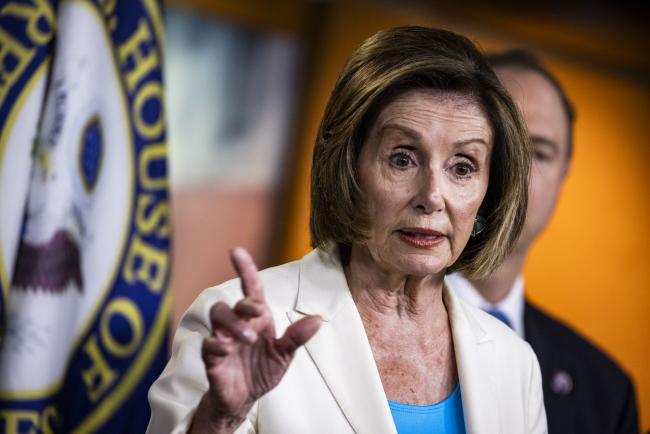(Bloomberg) -- With a month to go before a suspension of the federal debt ceiling runs out, the U.S. Congress lacks a clear plan to raise it, even as the majority Democrats express confidence that a payments default will be avoided.
“We’re considering all the options,” House Speaker Nancy Pelosi said in a brief interview Thursday when asked about her legislative strategy.
One option being discussed by Democrats is to raise the debt ceiling using the same so-called budget reconciliation package they plan to use to enact most of President Joe Biden’s $4 trillion, longer-term economic agenda. That package needs just a simple majority to pass in the Senate, thereby bypassing a Republican filibuster, but it may not be ready for final votes until September or October. Another option is to use the budget reconciliation process to set up a stand-alone bill to boost the debt ceiling.
The debate is one well-known to investors, going back decades. Republican lawmakers typically use the issue to criticize deficit spending, while the administration of the day highlights the need to boost the limit -- a simple consequence of previously enacted legislation -- to avoid any hint of doubt about the U.S. honoring its payment obligations.
In 2011, Republicans’ initial refusal to agree to raise the debt ceiling at the request of then-President Barack Obama laid the ground for a downgrade of the U.S. sovereign credit rating, roiling financial markets. The limit was later increased after Democrats agreed to discretionary spending cuts, and to caps for future spending -- though those were subsequently largely evaded.
Election Worry
Many experts argue that budget reconciliation allows for an increase -- though not another suspension -- of the limit. But some moderate Democratic members may be reluctant to vote for a debt ceiling increase that’s done without Republican votes, wary of getting attacked on the campaign trail in 2022 by GOP opponents as profligate deficit spenders.
House Budget Chairman John Yarmuth said Democrats are also talking about voting to suspend the debt ceiling to Oct. 1, 2022 as part of a budget resolution they want to pass next month to set up the fast-track reconciliation bill. Doing that in the House would still require a suspension bill to pass the Senate with 60 votes -- giving Republicans a chance to hold the bill hostage for some demands.
“There is not a guarantee we can get 60 votes in the Senate to do that,” said Yarmuth. “There really hasn’t been a lot of discussion about it.”
The U.S. Treasury will be able to deploy extraordinary accounting maneuvers to avoid a default for some time after the current debt ceiling suspension ends July 31. Treasury Secretary Janet Yellen has indicated that those measures could run out during Congress’s long August recess, which lasts until early September, but hasn’t given a firm date.
“I spoke to Secretary Yellen, and she said it is just too hard to predict right now,” Yarmuth said on Wednesday.
Some Democrats are urging their leadership to try to raise the debt ceiling in July to avoid any market uncertainty that could harm the economic recovery.
“The answer is that we have to do it. The ‘how to do it’ will be a tactical decision that the leadership makes, but I think sooner is better than later,” said Democratic Representative Peter Welch of Vermont.
©2021 Bloomberg L.P.
